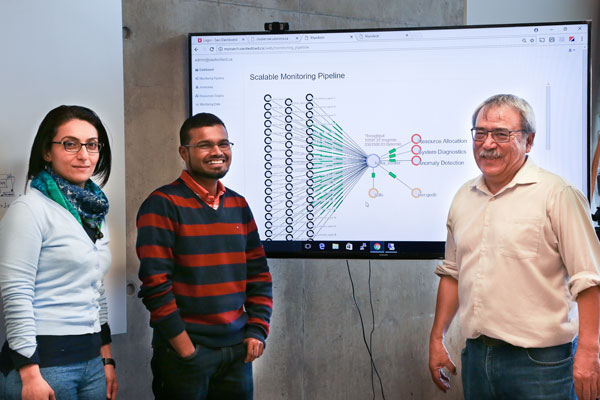
November 27, 2017
Data networks are the backbone of the Internet, but in many places they depend on a patchwork of outdated infrastructure, such as old routers and switches. A new research partnership led by Professor Alberto Leon-Garcia of The Edward S. Rogers Sr. Department of Electrical & Computer Engineering (ECE), aims to develop software that will make these networks more efficient and flexible while reducing the costs of maintenance.
“In Canada, the major internet service providers began life as telecommunications or broadcasting companies,” says Professor Leon-Garcia. “Over the years, they built up a legacy of equipment from different eras and using different technologies — optical equipment, packet equipment, there is quite a variety.”
All of this equipment was custom-built for transmitting data around the network. However, Leon-Garcia says that as processing speeds have increased, it has become possible to write software programs that accomplish the same task on general-purpose computers and servers.
Replacing old hardware infrastructure with new software, known as network softwarization, offers a number of advantages. For example, it lowers maintenance costs by reducing the amount of physical infrastructure needed and enables upgrades to be accomplished remotely, simply by changing the software code.
Another advantage of network softwarization is that it makes it easier to incorporate the Internet of Things (IoT) — the growing number of devices that collect and transmit data via embedded sensors, from electronic door locks and thermostats to refrigerators.
“How do you deploy the new set of functions associated with IoT devices?” asks Leon-Garcia. “If you’re dealing with the old network, it would be difficult, but if you can softwarize the network, it becomes more flexible.”
The NSERC Collaborative Research and Training Experience (CREATE) in Network Softwarization aims to develop the tools and the highly-trained personnel who will carry out this transformation. Supported by $1.65 million over six years, the program will train dozens of engineering graduate students in a suite of related skills, such as software-defined networking, network function virtualization, and DevOps (software development and operations.)
The team is led by Leon-Garcia and includes researchers from four universities: U of T, Université Laval, University of Waterloo and École de technologie supérieure. Industrial partners include Ericsson, TELUS, Bell Canada, Ciena, IBM Canada, InBay and SynerSolutions.
“This program brilliantly illustrates how our research projects combine multidisciplinary collaboration and strong industry involvement with rich experiential learning opportunities for our graduate students,” says Ramin Farnood, U of T Engineering’s Vice-Dean of Research. “Professor Leon-Garcia has assembled an excellent team, and we look forward to seeing the results in the coming years.”
“Tech giants like Google, Amazon and Apple have been moving to the network softwarization model for several years now,” says Leon-Garcia. “This project will create the skilled workforce that will enable smaller service providers to do the same. It will make them more competitive and more agile, and that difference in cost and performance will be passed on to consumers.”
More information:
Jessica MacInnis
Senior Communications Officer
The Edward S. Rogers Sr. Department of Electrical & Computer Engineering
416-978-7997; jessica.macinnis@utoronto.ca